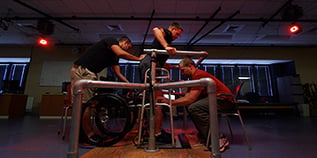Hope Happens Here: The Big Idea - Reeve Foundation
Determined people change the world: parents fighting against great odds for their children; scientists pursuing answers to questions deemed impossible; and innovators who light fires that illuminate the path to progress.
The Big Idea, the groundbreaking, Reeve-funded multi-year epidural stimulation trial at the University of Louisville's Kentucky Spinal Cord Injury Research Center, exists because of people who believed patients living with spinal cord injuries deserved a better future.
The story began in 1982, when 17-year-old Henry Stifel was paralyzed in a car accident. His parents, refusing to accept the grim prognosis delivered by doctors, launched the Stifel Paralysis Research Foundation to build a scientific field focused on treating spinal cord injuries.
Over the next decades, the foundation—renamed the Christopher & Dana Reeve Foundation in 2006 – funded research efforts around the world, created a community among the brightest scientific minds, and boosted the work of early pioneers, including UCLA scientist Reggie Edgerton.
Edgerton's research was rooted in the idea that a damaged spinal cord could adapt and be retrained with epidural stimulation. In 2009, with enough data on hand, Susan Harkema, a former post-doc in Edgerton's lab turned leading researcher at Louisville, used the technique for the first time on a patient with a complete C6-C7 injury.
Within three days of the surgery, Rob Summers was able to stand. Over the next several months, he regained voluntary movement and significantly improved cardiovascular, respiratory, and bowel and bladder function—all a shocking surprise.
When Harkema and Edgerton shared the news of these unexpected results with the Reeve Foundation, Research, and Planning Committee Chair, Arnie Snider experienced a lightbulb moment.
It was time to expand the focus of spinal cord injury research from just one cure to many and to translate the results into tangible, quality of life gains for patients. Snider dubbed the mission The Big Idea, the beginning of what would become the first comprehensive, FDA-approved trial studying epidural stimulation in paralyzed patients.
Reeve Foundation President and CEO Peter Wilderotter wasn't surprised that Snider, who died in 2014, saw the bigger picture.
"Arnie chased innovation and was always looking to redefine reality for people living with paralysis," Wilderotter says. "He recognized that life expands when ability increases. And he saw the opportunity to make a transformational difference for our community."
To date, 15 participants have had stimulators implanted in their lower backs as part of The Big Idea trial, with two more surgeries scheduled this fall. The group ranges in age from 21 to 62-years old and includes 11 men and four women from across the country.
Harlee Speyer, 23, first heard about The Big Idea in 2014, when the campaign to raise funds for the study had just begun. At the time, she was at Craig Hospital, recovering from a car accident that paralyzed her from the chest down. The thought of anyone pursuing treatment for a complete injury like hers was thrilling.
"It was a little bit of hope," she says.
Speyer returned home to Riverton, Wyoming, and signed up to be considered for the trial. In 2019, Harkema's team called. Speyer's extended family raised money for the plane ticket, and she relocated to Louisville.
So far, Speyer's motor recovery has progressed from no movement to flexing her ankle to bending her knee to her chest; cardiovascular gains, including improved overall fitness and blood pressure levels, have already made a difference in her daily life.
"I wasn't a functioning human," Speyer says. "I was falling asleep at 5 p.m. while all my friends were hanging out. Now I feel less tired all the time and can have a life. Even with spasticity, epidural stimulation helps me not fall out of my chair, and not have such a hard time doing the everyday tasks everybody else does."
In preliminary observations, Harkema sees similar quality of life improvements, including bowel and bladder function and blood pressure stability, among other participants. These secondary outcomes have already led to new avenues of research for Harkema's team.
"This gives us preliminary data to write other grants," she says, including one directly studying epidural stimulation on the bowel and bladder. "This investment has led us to even more discovery." Harkema says that her team's progress, could not have come without the longtime support of the Reeve Foundation.
"When I first started out, someone said to me, "Why are you working on the chronic and complete injuries? Nothing is going to come of it," she says. "Reeve had the consortiums that bought scientists together. Reeve believed in funding the chronic research. Reeve was the heart of the community."
Since 1999, Reeve has funded more than $140 million of research around the world and helped spotlight significant work throughout the field. Through initiatives like The Big Idea, it continues to advocate for change, and a better future for people living with paralysis, including Harlee Speyer.
"I'm living on my own, 21-hours away from my parents," she says. "I drive, I do everything by myself. Being given this opportunity for therapy, for getting stronger, for standing, all of those things have made what I am today. The Big Idea has definitely changed my life, physically and mentally, too."
For more information and to help support The Big Idea, please visit https://reevebigidea.org
Join Our Movement
What started as an idea has become a national movement. With your support, we can influence policy and inspire lasting change.
Become an Advocate